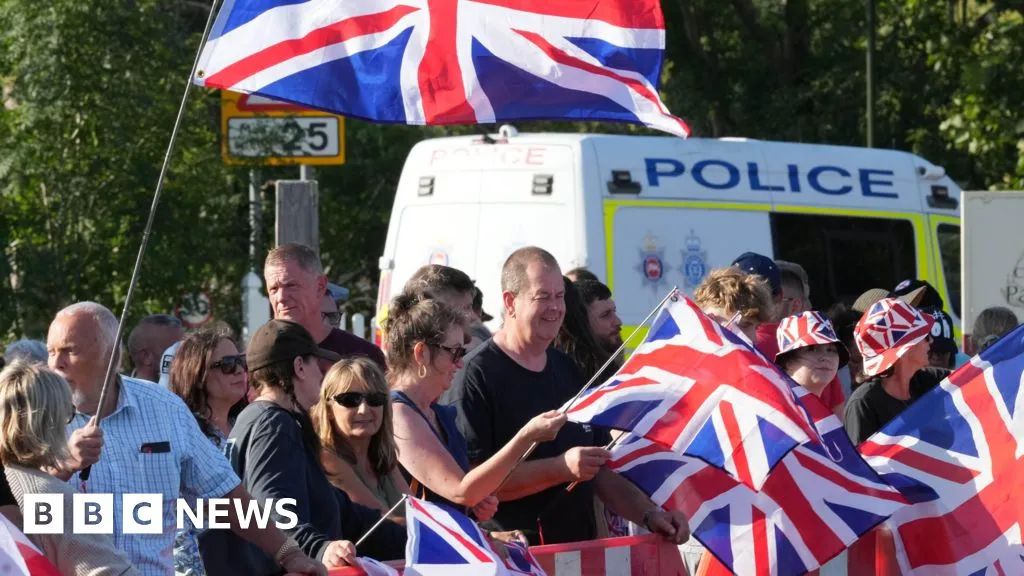After protests outside some hotels in Sussex where asylum seekers are being housed, BBC Sussex political reporter Lucinda Adam looks at the situation in the local area.
Protests have taken place in Chichester and Copthorne in West Sussex, both by groups who oppose asylum seekers being housed there by the Home Office and by those who say they are welcome.
Women living in hotels in Sussex told the BBC they feel unsafe, unwelcome and even traumatised following the protests.
On Friday the Court of Appeal overturned a temporary injunction granted to Epping Forest District Council in Essex, seen as a possible precedent for legal challenges by councils elsewhere to stop hotels being used in this way.
The latest Home Office figures show that at the end of June 2025, there were 1,073 asylum seekers being housed in hotels, known as "contingency accommodation", in Sussex.
The majority are living in West Sussex, with 1,018 divided between six or seven hotels in the county.
Mid-Sussex district has the most with 477, followed by Crawley with 268.
Chichester has 161, while Horsham has 112 asylum seekers in hotels.
The other 55 are staying in Brighton and Hove, meaning there are currently no asylum seekers being housed in this way anywhere in East Sussex.
The number of asylum seekers being housed in hotels by the Home Office in Sussex has been steadily declining over the past two years, from a peak of about 1,800 in summer 2023.
The data shows Afghans are currently the most common nationality in hotels in the South East, followed by Iran, Syria and Iraq, but that others come from more than 100 different countries.
Joining a peaceful protest one Sunday morning outside Copthorne Hotel, residents told the BBC they felt the safety of their community was being affected.
Leah said: "I have two daughters and I honestly feel that their safety is degrading on a daily basis.
"This is where I had my honeymoon. It's a four-star hotel. It's got a sauna and a jacuzzi and a pool. The people in it have come here illegally into our country."
Kat had also come to protest, with an opposing view.
She said: "This is not where the issue lies. These are some vulnerable people. The arguments that they are a safety risk to our girls and women is unfair and intimidating.
"We live in a society where our girls and women are at threat all the time from a growing misogynistic environment."
In Chichester, local resident Andy Sadler said he did not have a problem with asylum seekers being housed temporarily.
But he added: "I think it's a big loss to the community. We've lost an asset that provided a place to stay for relatives and friends.
“We’ve lost a hotel that hosted weddings and funerals and just general family based events.”
Mid Sussex District Council said it was "keeping a close eye on the situation" as it unfolded nationally and would review its position as further guidance came from the Home Office.
Chichester District Council said it was not looking at taking any legal action, adding it thought the situation was "very different" to that in Epping Forest in Essex.
Horsham District Council also said it was not considering any action because a decision was taken when a hotel was first used as an asylum dwelling that it did not require planning permission.
They said they would review their position if circumstances changed or further premises began to be used.
Councillor Jacob Taylor, deputy leader of Brighton & Hove City Council, said he was concerned about the current "division and unrest" around England over the issue.
He said: "As a proud city of sanctuary we will always play our role in housing asylum seekers and providing a welcome and support to those fleeing persecution and horrific circumstances which many of us can thankfully only imagine."
Crawley Borough Council did not respond to our enquiries.
Labour ministers have said they would end the use of migrant hotels by 2029, by cutting small-boat crossings and speeding up decisions on asylum claims.
While the number of people living in contingency accommodation has risen by 8% over the past year, the number of hotels in use has fallen from about 400 to fewer than 210.
Eastbourne, for example, had six hotels being used in this way in early 2023, but now all have been returned to public use.
A Home Office spokesperson said: "We will continue to work closely with community partners across the country, and discuss any concerns they have, as we look to fix this broken system together.
"The security of the local communities within which hotels are located will always be our paramount concern."
At 09:00 BST on Tuesday, the situation of asylum seekers at hotels in Sussex and the effect on the communities around them will be the focus of a special programme on BBC Radio Sussex.
Presenter James Cannon will hear from concerned residents, politicians, experts and our local reporters in Sussex and Surrey.
